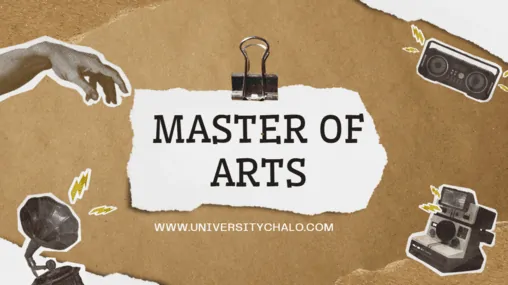The Value of a Global Perspective Gained from an MA Full Form Program
Discover the value of an MA full form program, its global relevance, and how it can transform your career and thinking. Learn more about its scope!

Pursuing higher education is a life-changing decision. It often shapes one’s career path, worldview, and personal growth. For many, opting for an MA program proves to be a pivotal step. The MA full form is "Master of Arts." This postgraduate course not only deepens subject knowledge but also broadens perspectives, helping individuals achieve academic and professional milestones. In this article, we’ll explore the importance of an MA program, its global relevance, and how it can transform your career and thinking.
Understanding the MA Full Form and Its Scope
The MA full form is Master of Arts, a degree that typically focuses on humanities, social sciences, and arts subjects. Unlike technical programs such as an MSc or MBA, an MA program emphasizes critical thinking, research skills, and cultural understanding.
Available in a wide range of disciplines like English, Political Science, History, and Sociology, an MA program allows students to specialize in their area of interest. The flexibility of the curriculum, paired with its focus on theory and practical application, makes it ideal for those aiming for careers in education, research, media, and public service.
Why Pursue an MA Program?
1. Deep Expertise in a Chosen Field
One of the main benefits of pursuing an MA program is the opportunity to specialize. If you have a passion for literature, history, or sociology, this course allows you to delve deeply into the subject. The structured curriculum encourages intellectual curiosity and academic rigor.
2. Enhancing Career Opportunities
Employers worldwide value the MA qualification because it demonstrates advanced knowledge, dedication, and problem-solving abilities. For example, professionals with an MA in English often find roles in content writing, teaching, or publishing, while those with an MA in International Relations can enter diplomacy or global organizations.
3. Global Perspective and Cultural Awareness
An MA course promotes global thinking. Whether you study global politics, world history, or cross-cultural communication, the program exposes you to international contexts. This broader perspective is invaluable in today’s interconnected world.
4. Research and Analytical Skills
The MA program emphasizes research, which is crucial for problem-solving and innovation. Students learn to analyze complex ideas, conduct independent studies, and present findings coherently. These skills are highly transferable across industries.
The Global Relevance of an MA Program
With globalization, the demand for professionals with cultural awareness and critical thinking has surged. The MA full form, Master of Arts, resonates across countries and is recognized as a prestigious academic qualification.
Opportunities in Education and Academia
Graduates often pursue teaching or academic careers. The MA degree serves as a prerequisite for a Ph.D., opening doors to advanced research and university positions.
Leadership Roles in NGOs and Think Tanks
MA graduates frequently contribute to policy-making and social reforms. Their analytical training helps them address global challenges such as poverty, climate change, and inequality.
Media and Communication Careers
For those pursuing journalism, advertising, or public relations, an MA program provides the communication skills and cultural understanding necessary for success in the media landscape.
Art and Culture
Many graduates use their MA qualification to curate art exhibitions, manage cultural projects, or work in the creative arts.
Skills Gained During an MA Program
1. Critical Thinking
The coursework encourages students to question assumptions, evaluate evidence, and form balanced opinions.
2. Effective Communication
Through essays, presentations, and discussions, students hone their verbal and written communication skills.
3. Time Management
Balancing classes, assignments, and research projects teaches students effective time management—a crucial skill in any profession.
4. Collaboration and Networking
MA programs often involve group projects and seminars, fostering teamwork and professional connections.
Choosing the Right MA Program
When selecting an MA program, consider factors like university reputation, faculty expertise, and course flexibility. Many universities offer part-time or online MA courses, making it easier for working professionals to pursue advanced education.
The Future After an MA Program
An MA degree opens up numerous opportunities. Whether you aim to climb the corporate ladder, contribute to social development, or explore academic research, the MA program equips you with the tools to succeed. Moreover, the global recognition of the MA full form ensures that your qualification is valued anywhere in the world.
Conclusion
The MA full form, Master of Arts, represents more than just a postgraduate degree—it’s a gateway to personal and professional growth. This program nurtures critical thinking, cultural awareness, and specialized knowledge, enabling graduates to excel in diverse fields. Whether you aspire to teach, lead, or innovate, an MA degree can set the foundation for a fulfilling career. By choosing an MA program, you’re investing in a brighter future with limitless possibilities.
FAQs
1. What is the MA full form?
The MA full form is Master of Arts, a postgraduate degree focused on humanities, social sciences, and arts subjects.
2. Who is eligible for an MA program?
Typically, graduates with a bachelor’s degree in a relevant field are eligible. Some programs may require entrance exams.
3. What are the career options after an MA?
Career options include teaching, research, content creation, public service, media, and leadership roles in NGOs or corporate sectors.
4. Is an MA program globally recognized?
Yes, the MA full form is widely recognized and respected globally, enhancing job prospects and academic opportunities.
5. Can I pursue an MA program online?
Many universities offer online MA programs, providing flexibility for working professionals or those unable to attend campus-based courses.
What's Your Reaction?














